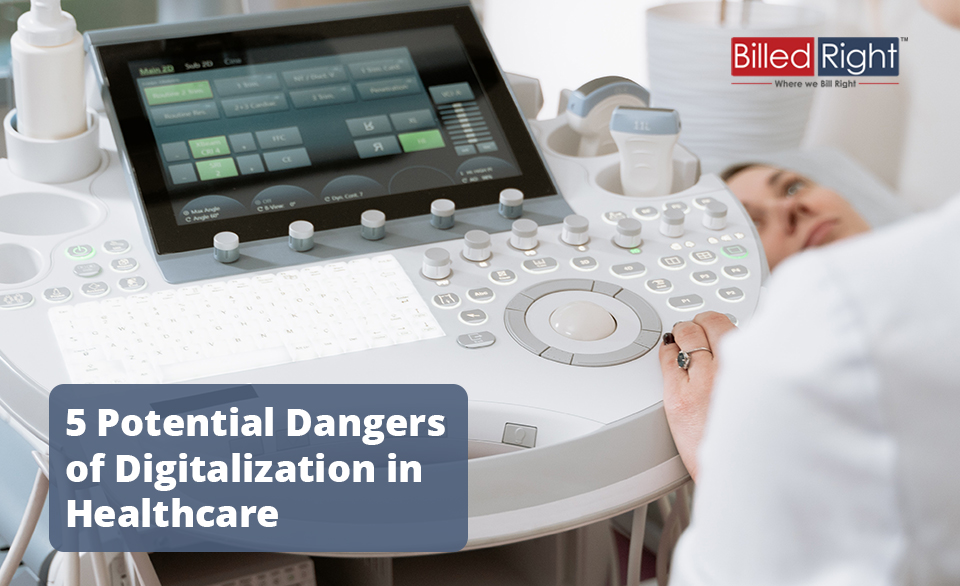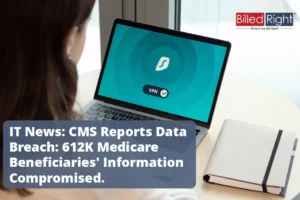5 Potential Dangers of Digitalization in Healthcare

Digitalization has revolutionized the healthcare industry, offering many benefits and advancements that have transformed how healthcare services are delivered. Integrating technology and data-driven solutions has improved efficiency, accuracy, and accessibility, enhancing patient care, streamlined processes, and cost savings. Digitalization enables healthcare providers to leverage innovative tools such as electronic health records (EHRs), telemedicine, and remote patient monitoring, resulting in improved diagnostics, personalized treatment plans, and expanded reach to underserved populations.
However, alongside these remarkable advancements, it is crucial to recognize the potential dangers accompanying digitalization in healthcare. As technology becomes increasingly intertwined with patient care, the risks to patient privacy, cybersecurity, and the integrity of electronic health records become significant concerns. Addressing these challenges is essential to ensure patients’ trust and confidence, protect their privacy, and maintain the security and reliability of healthcare systems.
Risks to Patient Privacy
One significant concern to patient privacy is the vulnerability to data breaches and cyberattacks. The healthcare industry is one of the most targeted industries for cyber criminals. Such breaches can lead to the unauthorized disclosure of personal health information, compromising patient confidentiality and potentially causing harm.
These privacy violations have far-reaching consequences. Healthcare organizations face legal and financial repercussions, reputational damage, and erosion of patient trust. Additionally, patients may suffer emotional distress, loss of faith in the healthcare system, and potential misuse or discrimination based on compromised personal information.
To address these risks, it is vital to prioritize patient privacy in the digital era. Implementing robust security measures, such as stringent access controls, encryption techniques, regular system audits, and comprehensive staff training on privacy protocols, is crucial. By actively addressing these challenges, healthcare organizations can protect patient privacy, foster trust, and ensure the integrity of healthcare systems in an increasingly digitized landscape.
Cybersecurity Threats
Cybersecurity is of utmost importance in healthcare, guarding against malicious activities in the digital realm. As digitalization expands, so do the complexities and risks associated with cybersecurity in healthcare.
Phishing attacks, ransomware, and insider threats are some of the prevalent cybersecurity risks. Phishing involves deceptive techniques to gain unauthorized access, while ransomware encrypts data and demands payment for its release. Insider threats involve the misuse or unauthorized disclosure of sensitive data from within the organization.
To mitigate these risks, healthcare providers must prioritize robust cybersecurity measures. This includes implementing strong firewalls, encryption techniques, regular security assessments, and comprehensive employee training.
Electronic Health Records (EHRs)
EHRs are vital in modern healthcare, however, they are not without risks. Errors in EHRs, stemming from data entry mistakes or system glitches, can compromise patient safety and care quality. Additionally, the digital storage and exchange of sensitive patient information in EHRs make them susceptible to data breaches, violating patient privacy and exposing healthcare organizations to legal and reputational consequences.
Another concern is system downtime, which can hinder access to critical patient information and disrupt healthcare delivery. To mitigate these risks, healthcare providers must establish proper data entry protocols, implement robust cybersecurity measures, regularly audit EHR systems, and have contingency plans in place to address system downtime. Prioritizing the integrity and security of EHRs is essential to harness their benefits while minimizing associated risks.
Medical Device Vulnerabilities
The security of medical devices is of utmost importance in the healthcare sector, as these devices are vital for accurate diagnoses and life-saving treatments. However, as we embrace the digital age of healthcare, it is crucial to address the vulnerabilities associated with medical devices.
One significant concern is the risk of cyberattacks targeting medical devices. Increased connectivity makes these devices susceptible to unauthorized access and manipulation, potentially compromising patient data and disrupting critical healthcare services. Additionally, malfunctions in medical devices pose risks such as incorrect readings, misdiagnoses, and ineffective treatments, leading to adverse patient outcomes and increased healthcare costs.
Patients may experience compromised health outcomes and decreased trust in medical technology, resulting in potential harm and inaccurate diagnoses. Prioritizing medical device security through robust authentication, regular updates, and comprehensive testing is essential for ensuring patient safety, trust, and the delivery of quality care in the digital era.
Telemedicine Concerns
Telemedicine has become increasingly important in healthcare over the last few years, providing remote access to medical services, improving healthcare accessibility, and enhancing patient convenience. Nevertheless, addressing the associated concerns and risks is necessary as telemedicine gains popularity.
One of the main concerns is the potential for data breaches in telemedicine. Transmitting patient information electronically introduces the risk of unauthorized access or interception, compromising patient confidentiality.
The impact of telemedicine issues extends to both healthcare organizations and patients. Patients may experience compromised care, delays in treatment, and reduced confidence in remote healthcare services. By addressing these concerns through robust privacy measures, appropriate protocols, and ongoing quality improvement, telemedicine can continue to revolutionize healthcare while ensuring patient safety and satisfaction.
Conclusion
We discussed the significance of patient privacy, the potential dangers of data breaches and cyberattacks, and the impact of these privacy violations on healthcare organizations and patients. Additionally, we explored the importance of medical device security, the risks posed by vulnerabilities and malfunctions, and their implications for patient safety and trust. Furthermore, we examined telemedicine-related concerns, including data breaches and the potential for misdiagnosis.
Healthcare organizations and providers must recognize the significance of protecting patient privacy and data security in the digital age. This requires implementing robust security measures, such as encryption techniques, access controls, regular system audits, and staff training on privacy protocols. Additionally, healthcare organizations should prioritize the security and reliability of medical devices, including rigorous testing, quality assurance, and ongoing monitoring. Moreover, clear protocols, privacy measures, and continuous improvement in telemedicine practices are essential to ensure safe and effective remote healthcare services.
By taking proactive steps to mitigate risks and prioritize patient privacy, healthcare organizations and providers can maintain patient trust, enhance the quality of care, and harness the benefits of digitalization in healthcare to better patients’ health and well-being.







